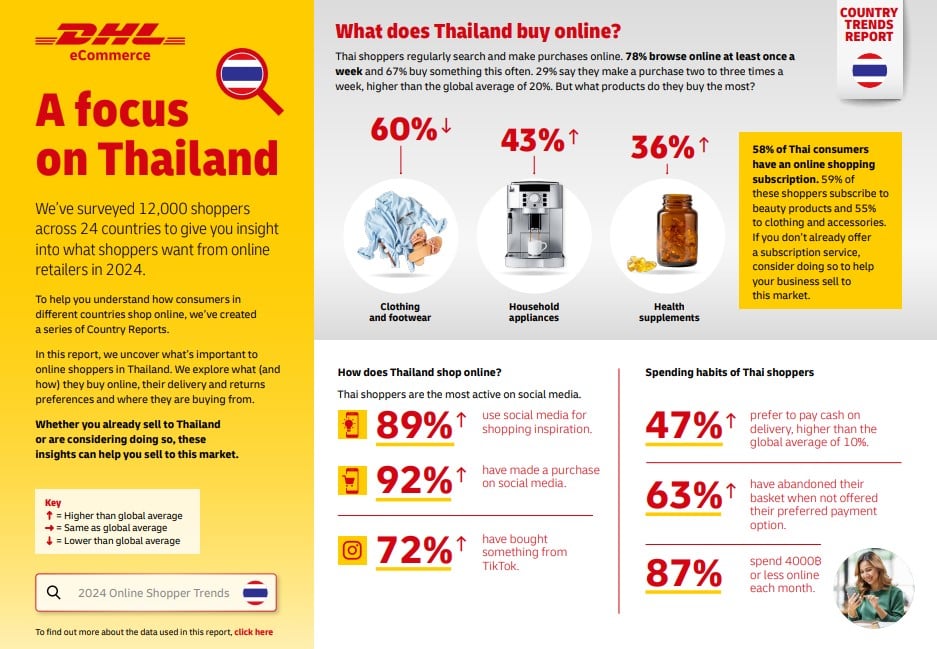
Navigating Thailand’s fast-evolving landscape for supply chain diversification

As profound geopolitical shifts continue to reshape global trade, Thailand stands at a tipping point. With its growing manufacturing base, strategic location, and competitive labor costs, the country has increasingly become an alternative to China in global supply chains.
Today, as geopolitical uncertainties continue, enterprises are accelerating strategies such as ‘China Plus X’ to help them diversify manufacturing bases and enhance supply chain resilience in Asia Pacific.
While Vietnam and Indonesia have garnered much attention in this transition, Thailand's efficient production capabilities – particularly in the automotive and electronics sectors – also position it well to capitalize on these trends.
But beyond its strong industrial base, what other long-term advantages make Thailand an attractive hub for global trade?
Unlimited growth potential
Recent World Bank projections indicate how Thailand’s economic momentum is gaining traction. The bank forecasts that GDP growth will accelerate from 2.6 percent in 2024 to 2.9 percent in 2025, underscoring a resilient and expanding economy.
Exports are a vital engine of this growth. These surged by 5.4 percent in 2024 – the highest annual increase on record, according to the Ministry of Commerce. The US, China, Japan, and the EU remain critical markets, with the UK and Switzerland emerging as promising export destinations.
Key industries, such as the electronics sector, are driving this surge in exports and strengthening the country’s global trade position. Analysts predict that this sector will increase at a robust compound annual growth rate (CAGR) of 8.49 percent between 2025 and 2029, resulting in a projected market volume of US$5.46 billion by 2029.
Thailand also has a healthy investment pipeline from companies looking to diversify production away from China and ease disruptions to their supply chains. In 2024, foreign direct investment applications surged 35 percent to US$32.8 billion, a 10-year high, led by foreign investment in data centers, cloud services, and advanced electronics manufacturing.
Robust infrastructure development
At the same time, fresh rounds of government infrastructure spending aim to boost private sector investment in Thailand and improve companies’ ability to participate in global supply chains.
Megaprojects include developing three coastal provinces along the Gulf of Thailand into a high-tech industrial hub by 2037. Known as the Eastern Economic Corridor initiative, the scheme aims to attract more foreign capital and technology investment through infrastructure construction and industrial policy support.
A key focus is transforming regional connectivity through new export infrastructure, including upgraded port facilities and a high-speed three-airport rail link.
Connecting the dots
Thailand’s infrastructure development has also set the tone for logistics companies such as DHL Express, which operates a robust aviation and ground network in the country. This includes a regional hub at Suvarnabhumi Airport, 15 service centers, and 131 service points, facilitating international express deliveries with 85 dedicated flights weekly.
The new International Multimodal Hub under DHL Global Forwarding further strengthens Thailand’s role as a regional trade center, streamlining shipping with seamless transitions between different modes of transport and simplified customs procedures.
“As Thailand positions itself as ASEAN's key EV manufacturing hub by 2025, our solutions, such as our integrated multimodal network, will help support the nation’s ambitions," said Vincent Yong, Managing Director of DHL Global Forwarding Thailand.
Key locations in the Eastern Economic Corridor are served by over 678,000 sqm of DHL Supply Chain warehouse space across more than 70 facilities, connected by an extensive transport network to handle approximately 4,800 vehicle loads every day.
A fast-growing hub for EV production
Continued infrastructure investments and policy support are also helping to strengthen Thailand’s role as Southeast Asia’s top automotive producer and a rising hub for electric vehicle (EV) production.
The Thai government has implemented various measures – including investment promotions, tax breaks, and purchase subsidies – to attract local and foreign EV manufacturers and drive market growth.
This is linked to the country’s broader commitment to tackling climate change, which includes plans to become the second Southeast Asian nation – after Singapore – to introduce a carbon tax in 2025.
The government’s incentives have seen major Chinese automakers such as SAIC Motor Corporation and BYD Auto, among others, launch EV production facilities in Thailand in 2024. Mazda also recently committed US$150 million to producing electric SUVs within the country.
Local EV demand is also rising sharply. For example, EV registrations saw a 380 percent surge in 2023. Based on these developments, the Electric Vehicle Association of Thailand predicts the local EV market will see a 40 percent sales increase in 2025.
Looking ahead, Thailand aims to produce 600,000 EVs annually by 2030, bolstered by government policies such as ‘30@30.’ This sets a goal of ensuring that EVs account for 30 percent of the country’s vehicle production by 2030, cementing the country’s position as a regional EV powerhouse.
On the logistics front, there is a concerted effort by DHL to support the EV narrative in Thailand. Its extensive solutions across the EV supply chain supports the Thai government’s ambitions as it works towards its goal of having EVs account for 30 percent of its vehicle production by 2030.
“We empower businesses of all sizes in Thailand to harness global opportunities while promoting a sustainable future through our trusted and effective solutions like the GoGreen Plus service. We are ready to help connect the world to Thailand and open new markets for Thai businesses," said Herbert Vongpusanachai, Managing Director of DHL Express Thailand & Head of Indochina.
A rapidly expanding e-commerce sector
Another bright spot is Thailand’s digital economy, particularly its e-commerce sector, which is experiencing rapid growth.
According to the Thailand E-Commerce Association, the sector’s market value is projected to surge from US$26.5 billion in 2023 to US$32 billion in 2025. That translates to a CAGR of about 10 percent.
Much of this growth is being driven by Thailand’s vibrant SME sector, which comprises 3.2 million businesses contributing 35 percent of the country’s GDP.
Thailand 4.0, the government’s strategy for transforming Thailand into a high-income, innovation-driven economy through technology and digital infrastructure, is also providing the technological backbone and policy support necessary for the e-commerce sector’s rapid growth.
By fostering digital payments, SME digitalization, and high-speed internet infrastructure, the government aims to ensure that Thailand can remain competitive in the fast-evolving global digital economy.
DHL eCommerce's ongoing investments in advanced solutions will further enhance service quality for e-retailers, SMEs, brands, and enterprises. A major hub upgrade is set for 2026. This is in conjunction with its extensive delivery network, which includes full market coverage with 151 last-mile depots, more than 2,000 vehicles, and 230 service points, thus enabling next-day delivery service for up to 97 percent of all deliveries.
“By integrating our nationwide delivery network with cutting-edge technology and sustainable logistics solutions, we empower Thai businesses of all sizes and sectors, whether B2B or B2C, to thrive in the digital economy," said Kiattichai Pitpreecha, CEO of DHL eCommerce, Southeast Asia.
Growth through reliable, well-connected logistics partners
Thailand presents vast opportunities for companies as global manufacturing demand surges worldwide. While its economic expansion is accelerating, challenges such as labor shortages, complex regulations, and increasing regional competition could hinder sustained growth.
Companies can successfully navigate the country's fast-evolving business landscape by understanding market dynamics and adapting to changes in policies, shifts in customer preferences, and advancements in sustainable transportation technology.
“With Thailand establishing itself as a key manufacturing hub for the automotive, technology and manufacturing sectors, coupled with a huge domestic retail market, we are very positive about the opportunities and are committed to supporting our customers’ growth and supply chain excellence in Thailand over the next few years," said Steve Walker, CEO of DHL Supply Chain Thailand Cluster.
To overcome these obstacles and successfully expand into global markets, companies in Thailand need reliable logistics partners that can streamline export operations and enhance supply chain efficiency. DHL’s strong track record, global footprint, and substantial logistics investments in Thailand mean it is well-positioned to support businesses as they grow and succeed.
In short, strategic partnerships will be crucial for capitalizing on industry growth and strengthening Thailand’s position in international markets.
ALSO WORTH READING















 English
English